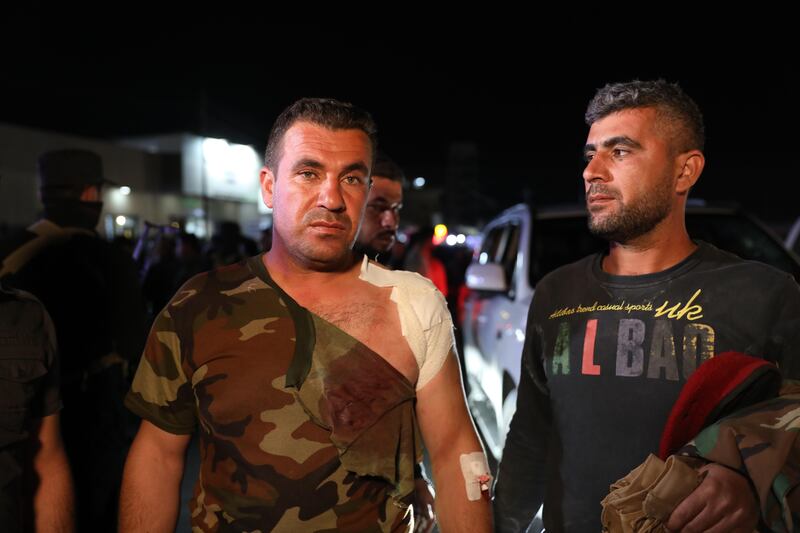Iraqi federal forces clashed on Sunday with Peshmerga fighters from the semi-autonomous Kurdish region, leaving at least three killed and seven wounded, following what security officials said was a misunderstanding and lack of co-ordination between the sides.
The skirmishes started when they raced to take control of three military posts on Mount Qarah Dagh in Makhmour district that had been vacated by the Turkish dissident group Kurdistan Workers Party (PKK), a federal security official told The National.
Makhmour district is part of the “disputed areas” claimed by both Iraqi Kurds and Arabs, situated between the Kurdish region and Baghdad-controlled areas in the northern province of Nineveh.
The mountainous area lies about 70 kilometres south-east of Mosul, the capital of Nineveh, and 60km south-west of the Kurdish regional capital, Erbil.
The Peshmerga claimed that the posts were within their territory because the mountain has historically represented the dividing line between Iraqi security forces and the Peshmerga.
The security official in Baghdad said there was an agreement with the PKK that the mountain posts would be handed to Iraqi military, but Peshmerga fighters tried to take them.
“The troops from both sides acted on their own and opened fire without going back to their leaders,” he said.
“The clashes lasted for about two hours and when both sides started to call for reinforcements, commanders scrambled to defuse the tensions.”
The posts were then came under the control of the Iraqi army, he said.
“This is a proof that there is a need of bigger co-ordination and co-operation between Baghdad and Erbil,” Hadi Jalo Marie, chairman of the Political Decision think tank in Baghdad, told The National.
“The incident also indicates the need to quickly reach arrangements and laws to solve the issue of the disputed areas.”
With the recent developments linked to the Israel-Gaza war, the region and Iraq are going through “hard times” and there is a “need to avoid any conflict and work towards solving such pending issues politically”, Mr Marie said.
Iraqi Prime Minister Mohammed Al Sudani, the commander-in-chief of the armed forces, ordered an investigation into the incident by a high-level committee, Iraqi military spokesman Yahya Rasool said.
Maj Gen Rasool put the death toll at three and seven others wounded, without giving a breakdown.
“All leaders and commanders at all levels, whether from the federal government-run troops or Peshmerga, need to practise self-restraint and act with wisdom,” he said.
The Peshmerga issued a statement on Monday regretting the incident and underlining their “commitment with the federal government in order to achieve a comprehensive and lasting solution to ensure stability and security across Iraq”.
The last time clashes broke out between the two sides was in 2017, when government forces launched a surprise offensive in retaliation for an independence referendum organised by the Kurdish regional government.
The PKK announced that they were vacating the mountain posts on Thursday, citing what they said was the declining threat of the extremist ISIS group in the area. They had held the military position since 2014, during the war against the group.
The PKK has been waging an insurgency against the Turkish state since 1984, initially seeking an independent Kurdish state before changing its demands and seeking an autonomous Kurdish region within Turkey. The conflict has killed about 40,000 people, many of them civilians.
It has training camps and bases in the Iraqi Kurdistan region and is designated a terrorist group by the US and EU.
Ankara's military operations against the PKK in Iraq and Syria have led to casualties not only among its fighters, but also civilians.
Iraqi Kurdistan has complicated relations with the PKK because its presence in the region impedes trade relations with neighbouring Turkey.







